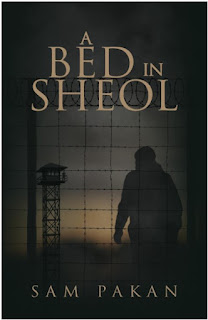May 19, 2024, column from the Amarillo Globe-News:
Novels depict characters' spiritual growth amid WWII conflict
By Mike Haynes
Two novels set in a World War II Europe infested with Nazis and full of intrigue, romance, history and philosophical conflict had their genesis in Shamrock, Texas.
“Jesse’s
Seed,” published a few years ago, follows David Dremmer from his life on a
ranch, working with cattle and horses and trying to deal with Jesse, his
difficult father, to the gunner’s seat in a B-17 bomber to confinement in a
Nazi prison camp. Along the way, author Sam Pakan takes David through the
emotions of a less than ideal marriage to falling for a resistance spy named
Nicole while questions of faith and morality torture the main character’s soul.
Now
the second book, “A Bed in Sheol,” picks up the story where it left off, with
David in the hands of Germans but buoyed by dubious help from a Luftwaffe
officer. Both novels are available on the Amazon and Barnes and Noble websites.
Pakan
grew up on a ranch near Shamrock, and the stimulus for writing about World War
II came from his association with two uncles and a neighbor who were WWII
veterans. One uncle was reluctant to talk about his experience in the Pacific,
saying, “I lost my best friend there.”
Working
on his master’s thesis at West Texas A&M University, Pakan interviewed a
neighbor who had been held in Stalag 17b, a notorious prison at Krems, Austria,
during the war.
“Stalag 17b would have provided a good deal of history
and drama, but it wouldn’t have been a place where a Nazi with a conscience
could have remained, and that was part of the conflict I had wanted to insert
in the first novel,” Pakan explained. So he set David’s experience elsewhere
and created the Nazi officer, Heinrich Schneider. “I just imagined that some in
the Reich must have struggled with their conscience, and, as a result, were
broken by what they saw,” said the author, who made David the protagonist and
Schneider the antagonist.
David was conceived as “a weak man who was haunted by
his past and had more than ample room for growth,” Pakan said. Part of that
growth is spiritual, as the American makes a move toward God in the first book.
But Pakan doesn’t consider the books “Christian novels.”
“My books are written from a Christian world view, but I don’t see them as evangelical,” he said. “They offer glimpses of Christians and non-Christians walking through difficulties. It would be inauthentic to not picture a Christian praying and not asking God why.
“Christians
believe there are reasons things happen, that God exerts influence in His
universe, that there is an ordering force, so we ask for deliverance when
difficulties come. When deliverance doesn’t come, we question it.
“It
would be inauthentic to depict people who believe in God, who know He hears our
prayers, to not question why. The atheist is left without even an expectation
of things ever making sense and should, therefore, see chaos as inevitable. The
fact that most don’t is telling, I think.”
Pakan
said the names Jesse and David in the story do reflect the Old Testament father
and son but that there is a limit to the connection. “This is by no means a
retelling of the story of King David,” he said. “I just see that some men are
thrust into positions of responsibility whether they want it or not.
“I
don’t think King David sought fame or position. He was a flawed man in many
ways and weak in others, but God called him a man after His own heart and chose
him to lead the nation of Israel. Why? I don’t think the ancient king had any
idea why, just as David Dremmer has no understanding why things seem to fall on
his shoulders. In that sense, he is an everyman for his generation who, like so
many, answered the call and did what had to be done. I see that as heroic.”
In
both books, the character Bear is David’s trusted friend. Pakan said Bear was
based in part on his neighbor who had been in Stalag 17b and also on a close
friend of Pakan. “I suppose all my characters, at least to some degree, are
amalgamated from people I’ve known or known about,” the writer said. “Even
Nicole, though I’m not telling you where I came up with her.”
One character definitely is based on someone from
Pakan’s past. “Dancer, the horse introduced in the first book, was unabashedly
created out of my dealings with my favorite horse,” he said. “His name was
Heir, and he wasn’t black, but sorrel. Still his character comes through in
every scene he’s pictured in. He served me faithfully for years and was a close
friend. He deserves a tribute, and I intend to give him one.”
Lovers of the ranching life will find familiar
details in these books, and readers who like suspense or romance will be
rewarded. History buffs will recognize real events and people, including a character’s
interaction with Winston Churchill, complete with his cane and cigar.
Beyond the surface are well-developed characters,
their minds and motivations pricked by moral and spiritual conflict.
Pakan hopes to write two more books in the series.
“Considering how slow I write,” he said. “I’m praying
for a long life.” He envisions the stories of David and Nicole ending around
2010.
“I’ve
had these people living in my head rent free for years,” he said, “and it’s
time they made it on their own.”



